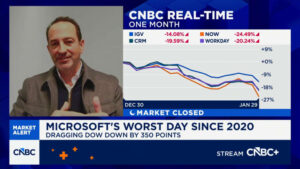JPMorgan Chase & Co. CEO Jamie Dimon used the word “crisis” 17 times in his annual letter to shareholders as he mulled a complex world economy that is facing higher interest rates, a war in Ukraine and rising geopolitical tensions.
As Dimon positions the largest U.S. bank to withstand an uncertain economy, he expanded on his idea from the past year about a squall on the horizon as the U.S. Federal Reserve hikes interest rates and sells off assets on its balance sheet.
While the current economy is “pretty good,” Dimon said he continues to see storm clouds ahead.
“[There is] potential trouble brewing from unprecedented fiscal spending, quantitative tightening and geopolitical tension,” Dimon said in his letter to shareholders, released Tuesday. “[We’re] preparing for what may be a new and uncertain future.”
Also read: JPMorgan’s Jamie Dimon says banking crisis is ‘not over,’ but it will pass
Shares of JPMorgan
JPM,
fell 1.3% on Tuesday, bringing the stock’s 2023 loss to 4.2%. JPMorgan is a component of the Dow Jones Industrial Average
DJIA,
which is up 1.1% so far this year.
The collapses of Silicon Valley Bank and Credit Suisse
CS,
last month have also affected expectations for economic growth, he said.
“The failures of SVB and Credit Suisse have significantly changed the market’s expectations, bond prices have recovered dramatically, the stock market is down and the market’s odds of a recession have increased,” Dimon said. “And while this is nothing like 2008, it is not clear when this current crisis will end. It has provoked lots of jitters in the market and will clearly cause some tightening of financial conditions as banks and other lenders become more conservative.”
The U.S. Federal Reserve has reduced its securities holdings by $550 billion, with a commitment to cut its holdings by nearly $100 billion in securities each month, or more than $1 trillion each year, he said.
“How all this will unfold is still unknown as the direction and speed of money have changed significantly from prior years,” Dimon said. “To varying degrees, banks will compete for money, not only among one another but also with money market funds, other investments and the Fed itself.”
Meanwhile, money-market funds have increased to a record $5.4 trillion as savers pull money from bank deposits, according to data release last week.
“So while the Fed’s balance sheet has come down by approximately $550 billion, deposits at the banks have come down by $1 trillion, largely uninsured deposits,” Dimon said. “Unfortunately, some banks invested much of these excess deposits in ‘safe’ Treasuries, which, of course, went down in value as rates rose faster than most people expected.”
Other issues complicating the economic outlook include higher fiscal spending, higher debt to gross domestic product, increased energy costs and price inflation from trade adjustments, he said.
These are all signs of a starkly different economic environment compared with the low interest rates and easy borrowing of the past decade, he said.
“We may have gone from a savings glut to scarce capital and may be headed to higher inflation and higher interest rates than in the immediate past,” Dimon said. “Essentially, we may be moving, as I read somewhere, from a virtuous cycle to a vicious cycle.”
Also read: Bank stocks end tough quarter with gains as sector stabilizes despite outflows from savings accounts
This post was originally published on Market Watch






